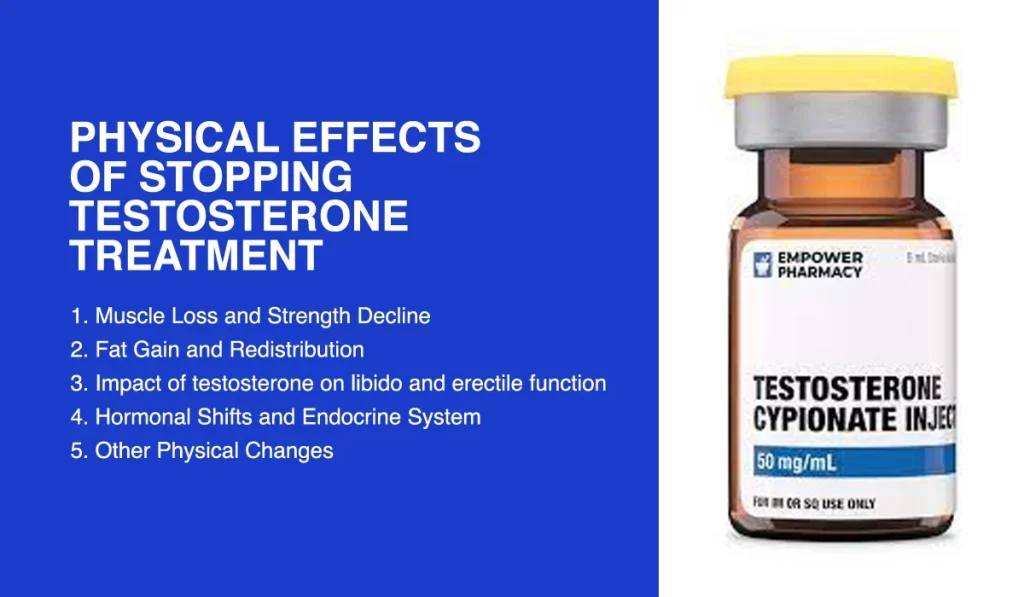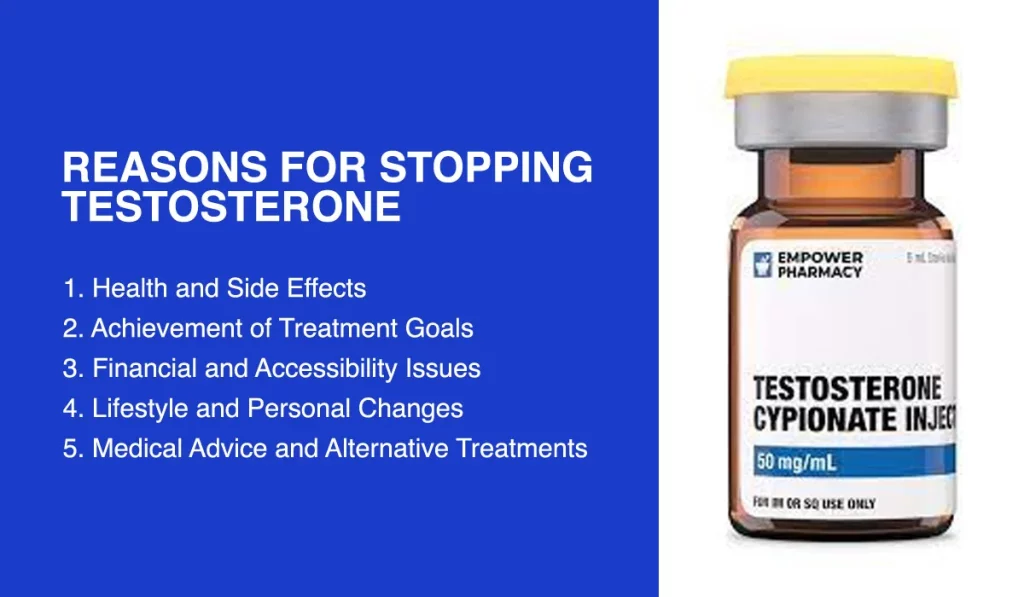FREE SHIPPING ON ORDERS $99+ | SAME DAY SHIPPING ON ORDERS PLACED BEFORE 12PM PST
What Happens If You Stop Taking Testosterone?
Contents
- What happens when you quit taking testosterone?
- Testosterone Withdrawal Symptoms
- Role of Testosterone in the Body
- Reasons for Stopping Testosterone
- Stopping Testosterone: Managing the Transition and Side Effects
-
FAQs
- What Happens When You Take Testosterone?
- What is Testosterone suppression?
- How long after stopping testosterone do levels return to normal?
- What is the Testosterone withdrawal timeline?
- What happens if a woman stops taking testosterone?
- What to take when coming off testosterone?
- Where can I buy AAS products online in Canada?
- Final thoughts: Stopping Testosterone Treatment
When individuals stop taking testosterone, it might result in a decline in muscle mass, diminished energy levels, and potential shifts in mood and cognitive function. Lack of testosterone can even result in females experiencing a resurgence of menstrual cycles.
Testosterone is a vital sex hormone in males, instrumental in developing reproductive tissues and expressing male traits like facial hair and a deep voice. Its impact extends beyond reproductive health, influencing muscle mass, bone density, and overall energy levels in both genders, highlighting its essential role in overall well-being.
What happens when you quit taking testosterone?
When you quit taking testosterone, you may experience symptoms including fatigue, increased fat, decreased libido, and mood alterations. However, the circumstances and motives behind ending the treatment can potentially alter these symptoms.
Testosterone Replacement Therapy (TRT) is usually prescribed for medical purposes like addressing hypogonadism, gender transition, weight loss, etc. Discontinuing testosterone use might lead to a decrease in muscle mass, body hair, and potential feminization. Abrupt discontinuation without proper guidance can pose health risks and complications, making it essential to seek the advice of your healthcare provider.
Physical Effects of Stopping Testosterone Treatment

Five common adverse physical effects of quitting testosterones are muscle loss and strength decline, fat gain and redistribution, the impact of testosterone on libido and erectile function, hormonal shifts and endocrine system, and other physical changes.
Testosterone cycles and dosages are important to maintain a harmonious balance that enhances overall health, avoiding adverse symptoms of insufficient dose levels, as per Harvard Health. Precise calibration of testosterone dosage is essential to sustain key physiological functions, impacting aspects such as muscle mass, bone density, mood, and overall vitality.
The 5 common adverse physical effects of quitting testosterones are described below.
- Muscle Loss and Strength Decline: Ceasing testosterone supplementation can disrupt the hormonal balance necessary for sustaining muscle mass, potentially causing a decline in muscle protein synthesis, accelerated muscle loss, and diminished overall strength.
- Fat Gain and Redistribution: According to Healthline, when someone stops taking testosterone, changes in fat distribution can occur, leading to potential weight gain. This redistribution is a consequence of hormonal shifts following the cessation of testosterone supplementation, influencing the body’s overall composition.
- Impact of testosterone on libido and erectile function: Testosterone significantly shapes libido, impacting the sexual drive in individuals of both genders. According to Liebertpub, optimal testosterone levels are vital for sustaining erectile function in men, directly influencing the physiological mechanisms necessary for achieving and maintaining erections.
- Hormonal Shifts and Endocrine System: A decline in testosterone levels can induce notable hormonal fluctuations in the endocrine system, affecting diverse physiological processes. This may result in decreased vitality, diminished muscle mass, and changes in mood and cognitive function.
- Other Physical Changes: Quitting testosterone or low testosterone levels may lead to various physical changes, such as shifts in skin texture and a decrease in overall body size.
Mental and Emotional Effects
There are several mental and emotional effects of testosterone, such as fluctuations in mood, energy, and general emotional state. Individuals undergoing this transition might contend with sensations of fatigue, irritability, or heightened emotional sensitivity, as per the National Institute of Health.
Two common mental and emotional effects of quitting testosterone are mood swings and depression, fluctuations in energy levels, and fatigue.
- Mood Swings and Depression: Quitting testosterone use can trigger pronounced mood swings and depression due to the abrupt hormonal changes, necessitating support from healthcare professionals for those navigating the emotional challenges associated with this transition.
- Fluctuations in Energy Levels and Fatigue: Quitting testosterone can lead to fluctuations in energy levels and increased fatigue as the body adjusts to the hormonal changes. Individuals may experience a temporary decrease in overall vitality, impacting their daily activities and well-being during this transitional period.
Testosterone Withdrawal Symptoms
Testosterone replacement therapy withdrawal can trigger a wave of unwanted symptoms as your body adjusts to lower testosterone levels. Fatigue, muscle loss, hormone imbalance, sleep disturbances, and mood swings are common culprits, with potential for more serious issues like depression and anxiety.
While individual experiences vary, it’s crucial to plan your exit with a healthcare professional, as a gradual tapering strategy and a healthy lifestyle can ease the transition and help manage these withdrawal symptoms effectively. Remember, support, monitoring, and professional help are valuable allies on this journey back to natural hormone balance.
Role of Testosterone in the Body
The role of testosterone in the body is to help develop and maintain male reproductive tissues and characteristics, including sperm generation, muscle mass, thinning hair, and hair loss.
In addition to its impact on sexual functions and sexual performance, testosterone influences diverse physiological processes such as bone density, fat distribution, and the production of red blood cells.
Maintaining a delicate balance is crucial, as imbalances in testosterone levels can lead to a range of health issues. This underscores the intricate role of testosterone in sustaining both physical and mental health for individuals, regardless of gender.
Learn more about Testosterone here: What does Testosterone do?
Reasons for Stopping Testosterone

There are several reasons for stopping testosterone, such as reaching desired physical changes, apprehensions about potential side effects, or a shift in their gender identity journey.
The five main reasons for stopping testosterone are health and side effects, achievement of treatment goals, financial and accessibility issues, lifestyle and personal changes, and medical advice and alternative treatments.
- Health and Side Effects: Health concerns and side effects frequently result in the decision to cease testosterone therapy as individuals weigh the potential risks against the positive benefits. Cardiovascular complications and increased risk of heart attack or strokes may push an individual to quit testosterone.
- Achievement of Treatment Goals: Upon reaching the predetermined treatment objectives, the possibility of discontinuing testosterone therapy emerges as a potential course of action, signifying the fulfillment of therapeutic goals. The goal could be losing fat, gaining lean muscles, or increasing libido.
- Financial and Accessibility Issues: Financial constraints and challenges in accessing healthcare services can be substantial obstacles, causing individuals to halt testosterone therapy due to affordability issues and limited medical support. Overcoming these barriers is crucial for ensuring equal access to hormonal treatments, particularly for transgender and gender non-conforming individuals.
- Lifestyle and Personal Changes: Implementing substantial shifts in one’s lifestyle and personal choices, such as adopting a sedentary routine, experiencing chronic stress, or sustaining an inadequate diet, can contribute to disruptions in hormonal equilibrium, potentially resulting in a reduction in testosterone production.
- Medical Advice and Alternative Treatments: Expert guidance from healthcare professionals, especially those specialized in endocrinology, can play a crucial role in individuals deciding to halt testosterone treatments. Additionally, the exploration of alternative treatments like exercise, avoiding tobacco and alcohol, maintaining an ideal diet, sleeping well, etc., contribute to the discontinuation of testosterone therapy.
Stopping Testosterone: Managing the Transition and Side Effects
Stopping testosterone is a multifaceted process that demands thoughtful consideration of both physical and emotional factors. Some of these potential side effects include mood fluctuations, changes in energy levels, and shifts in physical appearance, all of which necessitate close monitoring.
Support and counselling from healthcare professionals are integral to addressing concerns and facilitating a successful transition. Regular exercise, adequate diet, stress management, and good sleep are essential to maintain optimal natural testosterone production, according to Healthline.
Incorporate a safe and gradual post-cycle therapy (PCT) after you stop testosterone replacement therapy to aid in the body’s natural hormone production. The cycle generally lasts from 2-6 weeks but majorly depends on individuals and situations.
Implementing a cautious tapering-off approach within the cycle can mitigate potential side effects and facilitate a smoother transition post-therapy. Regular monitoring of hormonal levels and consultation with a healthcare professional during the PCT period is essential to ensure a safe and effective recovery from testosterone therapy.
FAQs
What Happens When You Take Testosterone?
When you take testosterone, it can lead to muscle gain, strength, and bone mass. It also regulates the sex drive and increases the production of red blood cells and sperm count.
What is Testosterone suppression?
Testosterone suppression refers to deliberately lowering or inhibiting the production and effects of testosterone, the main male sex hormone. This is typically achieved through medical means, like medications or hormonal therapies.
How long after stopping testosterone do levels return to normal?
It usually takes 18 months for testosterone to return to normal after quitting the TRT treatment. However, factors like age, genetics, dosage level, and duration may also influence the due date.
What is the Testosterone withdrawal timeline?
The testosterone withdrawal timeline is a maximum of two weeks for most men.
What happens if a woman stops taking testosterone?
Women may experience muscle weakness, sluggishness, reduced sex drive, weight gain, irregular menstrual cycles, and even fertility issues if they stop taking testosterone.
What to take when coming off testosterone?
Individuals should take zinc supplements when coming off testosterone. They should also focus on regular exercise and specific diets prescribed by their doctors while coming off their testosterone therapy.
Where can I buy AAS products online in Canada?
You can buy AAS products online from www.buyroidscanada.co. You will get discreet home delivery of steroids from our website if you wish to buy steroids in Canada. All our products are vetted for the highest quality and the price is unbeatable.
Final thoughts: Stopping Testosterone Treatment
Stopping testosterone therapy is a complex journey demanding careful planning and support. The potential for side effects and hormonal shifts calls for close monitoring and collaboration with healthcare professionals.
While incorporating post-cycle therapy can aid in natural hormone restoration, a gradual tapering-off approach is key to minimizing side effects and easing the transition. Remember, the impact of stopping testosterone extends beyond physical changes, so prioritizing mental well-being through support and healthy lifestyle choices is crucial.
The decision to stop testosterone requires informed choices and close professional guidance for a safe and successful journey back to natural hormone balance.
References:
- Vitality Aesthetic and Regenerative Medicine by Pastore, G. (2021, July 17) Can You Stop Taking Testosterone? https://varmedicine.com/can-you-stop-taking-testosterone/
- Testosterone: What it is and how it affects your health by (2023, June 22). https://www.health.harvard.edu/staying-healthy/testosterone–what-it-does-and-doesnt-do
- On the effects of testosterone on brain behavioural functions by Celec, P., Ostatníková, D., & Hodosy, J. (2015)Frontiers in Neuroscience, 9. https://www.ncbi.nlm.nih.gov/pmc/articles/PMC4330791/
- The Impact of Testosterone on Erectile Function Androgens by Schardein, J., & Hotaling, J. M. (2022, October 1) https://doi.org/10.1089/andro.2021.0033
Our dedication to unbiased and meticulously tested bodybuilding supplement recommendations has solidified our position as the most trusted resource in the Canadian bodybuilding community.
Our rigorous editorial process ensures that only the most effective and thoroughly evaluated supplements receive our endorsement.
